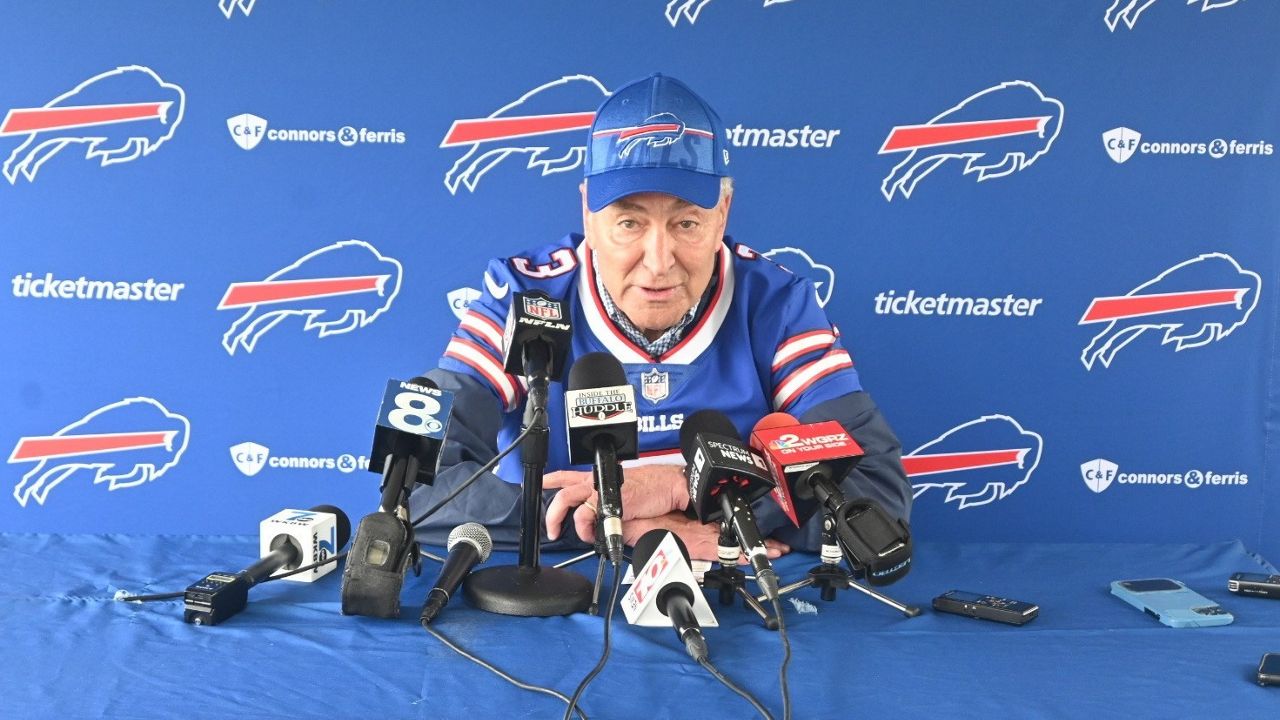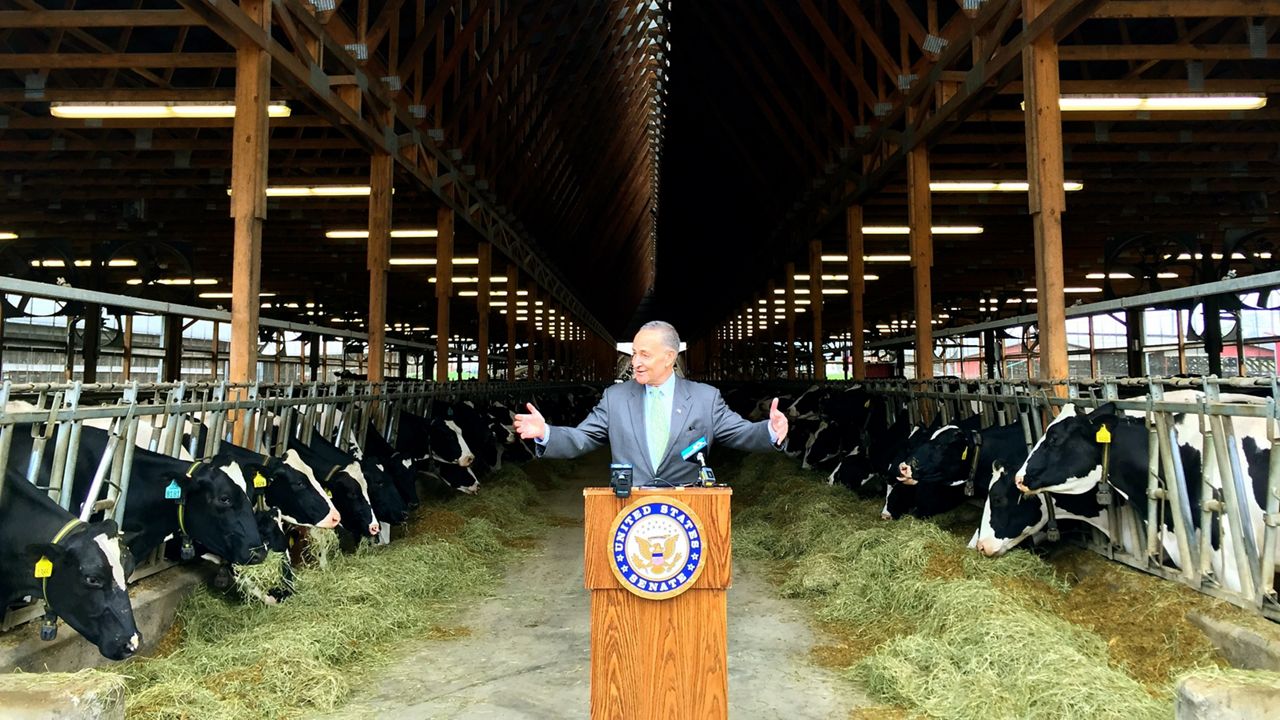It was a marquee matchup of the 1998 election.
Democratic Congressman Chuck Schumer and Republican Sen. Al D’Amato were facing off in a nasty and costly campaign for New York’s senate seat.
D’Amato, a three-term incumbent who had gained the nickname of ‘Sen. Pothole’ for his work on constituent services, argued that he knew how to deliver for New York. He painted Schumer as a diehard liberal. Schumer labeled D’Amato a liar and untrustworthy.
Schumer won, ending D’Amato’s 18 year Senate career.
More than two decades later, D’Amato now tips his hat to his successor, praising Schumer’s ability to get things done. Riffing off his own nickname, he dubs Schumer “Sen. Everything.”
“He hasn't held back when we needed money for our sewage treatment plant and said, ‘Oh, that's a Republican stronghold.’ He worked for it. He got it for us,” he said. “I want to tell you, I salute him for that.”
“If there are people in the Republican Party who are annoyed at me for saying these things about him, screw them. I call it the way I see it,” he continued.
Schumer’s rise to the Senate’s most powerful position over the past 25 years has given him increasingly greater influence to shape legislation, allowing him to deliver funding and projects for his home state.
If Republicans flip the Senate in next month’s election, that influence is poised to take a hit.
Tethered to New York
Even as his power and portfolio in Washington have grown amid his rise from freshman senator to Senate Majority Leader, Schumer remains tethered to New York.
From parades through Manhattan to the annual State Fair in Syracuse, he makes a point of visiting every one of New York’s 62 counties every single year.
“I find being on the scene and actually talking to people - real flesh and blood - is a much more effective way both to learn and to understand what people need. So I keep doing it,” Schumer told Spectrum News during one of those recent swings through upstate New York. “I love it. I love it as much today as I did the first year.”
The 62-county visits are a way to connect with conservative upstate voters who are normally suspicious of Downstate Democrats. They also dovetail with Schumer’s reputation as a workhorse.
Schumer says they inspire his legislative work, giving him ideas for macro policy proposals in D.C. that can have tangible, micro benefits back home.
“There's the local stuff and there's the national stuff. Not only do I like doing both, not only is it an important part of my job to do both, but one helps you do the other,” he said.

Record for New York
Perhaps few bills underscore this local-national approach more than the CHIPS and Science Act, which was designed to encourage the domestic production of semiconductors.
Schumer worked with Indiana Republican Sen. Todd Young on the bill - an idea that was hatched, in part, in the Senate gym.
“I could trust him when something needed to be kept confidential over the course of negotiations, never to violate my trust,” Young said. “The currency of this place is trust and respect. And he never let me down.”
The law, signed by President Joe Biden in 2022, has triggered commitments for tens of billions of dollars in spending to build and upgrade computer chip facilities across the country, including in New York.
In 2022, Micron announced plans to spend up to $100 billion over two decades to establish a factory outside Syracuse - a move Schumer called “transformational.”
Days later, IBM announced their own plan to invest $20 billion in the Hudson Valley.
Corning CEO Wendell Weeks tells Spectrum News he has worked with Schumer to help make the pitch for these sorts of investments. “I help him with other of my peers from around the world, explain why New York can be the right place for them,” he said.
Touching on Schumer’s dual role, Weeks said, Schumer “is - at one time - both this national figure working on issues and opportunities of global importance, but at the same time, he is intensely focused on what's happening right here in New York State.”
Another Schumer priority has been the construction of a new train tunnel under the Hudson River.
The current tunnels are more than a century old and were damaged during Hurricane Sandy, making the new tube critical to the future of the New York, Northeast, and U.S. economy.
The Trump administration was accused of delaying the long-sought plan, but after Biden entered the White House, Schumer helped push through the Bipartisan Infrastructure Law, securing some of the final chunks of federal funding required.
Deputy U.S. Transportation Secretary Polly Trottenberg, who once worked as Schumer’s legislative director, said Schumer “always kind of kept hope alive” on the tunnel project.
“There have been so many near-death experiences for that project … [Schumer] continued to nudge and push it. And then finally, the stars aligned,” she said.
Over the past two decades, Schumer pushed to keep the Buffalo Bills in Buffalo and lobbied to save the Binghamton Rumble Ponies minor league baseball team.
He helped secure $2.6 billion to build the world’s first electron ion collider at Brookhaven National Lab on Long Island. And he worked to pass new limousine safety standards following the deadly Schoraharie limo crash in 2018.
In the face of tragedies, including the 9/11 terror attacks and Superstorm Sandy, he helped steer federal aid to New York. And when the pandemic sparked shutdowns nationwide, he also successfully advocated for aid for theaters and cultural centers.
The Corning Museum of Glass was one of the institutions that received assistance.
“It was instrumental in helping us to survive until our visitation returned and got back to pre-COVID numbers again,” said Karol Wight, president of the museum.
One thing Schumer is particularly proud of is ending - at least temporarily - New York’s status as a “donor state” that sends more to Washington in tax revenue than it gets back in federal spending. That imbalance was a major frustration of the late Sen. Dan Patrick Moynihan.
In the past three years, fueled by federal COVID relief spending, New York finally received more than it sent away. However, New York State Comptroller Thomas DiNapoli has warned the trend may not last, particularly as the remaining pandemic-era aid dries up.
 A photo of Schumer with cows. (Photo courtesy of Schumer's office)
Role in NY Politics
A photo of Schumer with cows. (Photo courtesy of Schumer's office)
Role in NY Politics

Despite his intense focus on New York and his senior status in Democratic circles, aides say one role Schumer has not adopted is that of power broker within the state Democratic apparatus.
Whereas his predecessor, D’Amato, is credited with using his influence to make George Pataki the GOP nominee for governor, Schumer’s focus has been elsewhere.
“Being a party boss or attempting to sort of control the machinations of a political party doesn't necessarily lend itself to the kind of relationships necessary when you've got to build coalitions, or you've got to bring home the bacon, or you have to bring home policy results,” said Mike Morey, a former aide.
Ward Todd, a former Republican official in Ulster County, praises Schumer for his willingness to put party aside at times in pursuit of delivering federal spending and projects.
“I truly felt as if he was our local representative, much like our congressman was. He was here that often,” he said.
This is the second part of a three-part series profiling Sen. Chuck Schumer as he marks 25 years in the U.S. Senate. Part one, retracing the Brooklynite’s rise to Senate majority leader, can be found here. Part three, evaluating his leadership style as Senate majority leader, can be found here.



